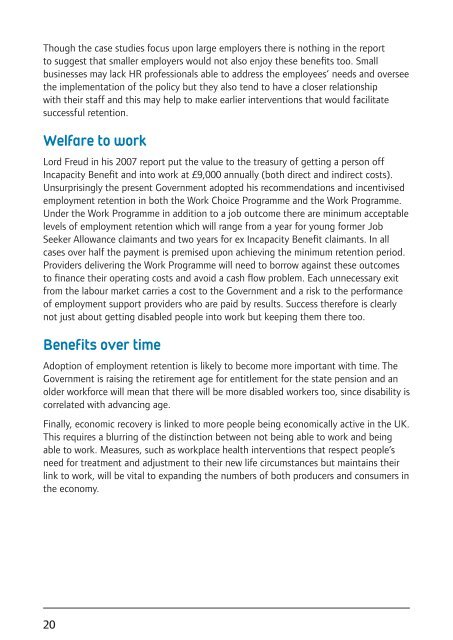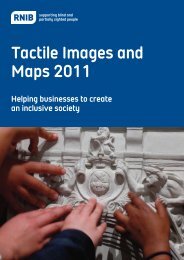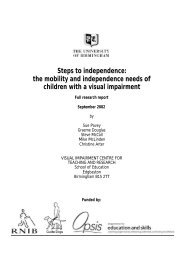Vocational rehabilitation: The business case for retaining ... - RNIB
Vocational rehabilitation: The business case for retaining ... - RNIB
Vocational rehabilitation: The business case for retaining ... - RNIB
You also want an ePaper? Increase the reach of your titles
YUMPU automatically turns print PDFs into web optimized ePapers that Google loves.
Though the <strong>case</strong> studies focus upon large employers there is nothing in the report<br />
to suggest that smaller employers would not also enjoy these benefits too. Small<br />
<strong>business</strong>es may lack HR professionals able to address the employees’ needs and oversee<br />
the implementation of the policy but they also tend to have a closer relationship<br />
with their staff and this may help to make earlier interventions that would facilitate<br />
successful retention.<br />
Welfare to work<br />
Lord Freud in his 2007 report put the value to the treasury of getting a person off<br />
Incapacity Benefit and into work at £9,000 annually (both direct and indirect costs).<br />
Unsurprisingly the present Government adopted his recommendations and incentivised<br />
employment retention in both the Work Choice Programme and the Work Programme.<br />
Under the Work Programme in addition to a job outcome there are minimum acceptable<br />
levels of employment retention which will range from a year <strong>for</strong> young <strong>for</strong>mer Job<br />
Seeker Allowance claimants and two years <strong>for</strong> ex Incapacity Benefit claimants. In all<br />
<strong>case</strong>s over half the payment is premised upon achieving the minimum retention period.<br />
Providers delivering the Work Programme will need to borrow against these outcomes<br />
to finance their operating costs and avoid a cash flow problem. Each unnecessary exit<br />
from the labour market carries a cost to the Government and a risk to the per<strong>for</strong>mance<br />
of employment support providers who are paid by results. Success there<strong>for</strong>e is clearly<br />
not just about getting disabled people into work but keeping them there too.<br />
Benefits over time<br />
Adoption of employment retention is likely to become more important with time. <strong>The</strong><br />
Government is raising the retirement age <strong>for</strong> entitlement <strong>for</strong> the state pension and an<br />
older work<strong>for</strong>ce will mean that there will be more disabled workers too, since disability is<br />
correlated with advancing age.<br />
Finally, economic recovery is linked to more people being economically active in the UK.<br />
This requires a blurring of the distinction between not being able to work and being<br />
able to work. Measures, such as workplace health interventions that respect people’s<br />
need <strong>for</strong> treatment and adjustment to their new life circumstances but maintains their<br />
link to work, will be vital to expanding the numbers of both producers and consumers in<br />
the economy.<br />
20
















